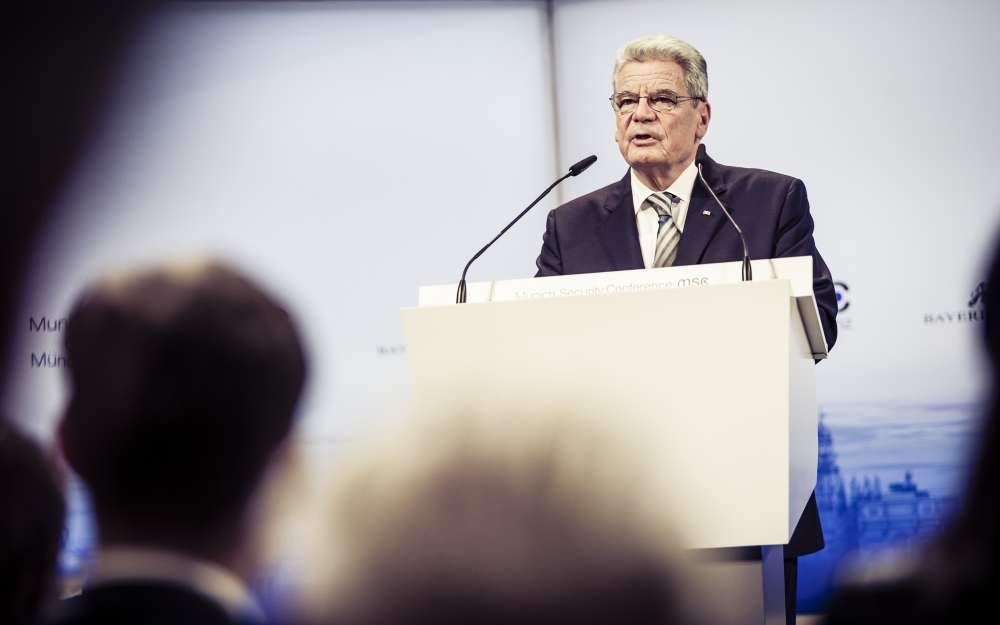Germany Needs More Than a Debate About the Military

The start of the 51st Munich Security Conference this Friday will mark the first anniversary of a new debate in Germany on its global responsibility to prevent atrocities. “He who fails to act bears responsibility too,” argued German President Joachim Gauck a year ago in Munich. It must be “natural for Germany and its allies to not simply refuse to help others who are threatened by genocide, war crimes, ethnic cleansing or crimes against humanity.”
Gauck’s speech was closely followed by carefully measured remarks of approval by the foreign minister, as well as a few resolute announcements by the new German defense minister Ursula von der Leyen, who within hours of Gauck’s speech floated the idea of German troops supporting an EU operation to prevent genocide in the Central African Republic. Immediately, the German foreign policy debate was back to where it tends to get stuck every time: in a quarrel about the use of military force, in particular German military force.
The controversy surrounding this question of using force hampers a serious debate on those policy tools that are not at all disputed: means of diplomacy, conflict management, international criminal justice and UN peace operations, with or without the military. Throughout 2014, while Germany debated its international responsibility, tens of thousands of people became victims of crimes against humanity in South Sudan, the DRC, Syria or the Central African Republic.
The call for help in preventing genocides and mass atrocity crimes does not have to result in military interventions, nor are we as powerless as we might feel when we see the pictures from Homs or Juba. Genocide and crimes against humanity require systematic planning. The organization of mass killings requires time and preparation. This creates opportunities to intervene that neither the German government and the European Union nor we as citizens have exhausted so far.
For the German government and the EU, the starting point should be effective early warning. The specific risk factors for mass atrocity crimes barely play a role in the reporting requirements for German officials in at-risk countries. Diplomats, intelligence agents and development workers all lack basic training in recognizing risk factors, including state-sponsored hate speech and the preparation of group-specific death lists, as well as effective ways of reporting them. The situation will never be clear-cut. But when concrete atrocity risks are identified, political leaders ought to have the courage and determination to react in time, even if that will be uncomfortable.
Practical prevention could mean applying diplomatic pressure or supporting mediation projects by civil society groups. In Burundi, more European diplomatic attention could help lower the risk of violence along ethnic lines during the upcoming May elections. Practical prevention could also mean applying the international criminal justice toolkit earlier and more effectively or imposing travel restrictions and asset freezes on those who lead or support atrocity crimes. Several of the leaders of the deadly FDLR militia in the DRC, for example, lived in Germany undisturbed for the better part of a decade before they were arrested and tried.
UN peace operations represent another tool that could prevent the worst through a combination of diplomatic, law enforcement and military means. Germany is paying its fair share into the peacekeeping system, but it is happy to let Asians and Africans bear the risks and burdens of deploying to the ground. German civilian specialists, police officers and soldiers are not only urgently needed. There would be sufficient volunteers. It is only politicians who stand in the way.
An active refugee policy could also save more lives – both by helping neighboring countries and international organizations as well as by taking in more people in Europe who fear for their lives at home.
But atrocity prevention is not just a job for governments and international organizations. Civil society in Germany could do more. Holocaust education projects could teach people about current mass atrocities without questioning the singularity of the Holocaust in the process. Recent atrocity crimes also need to be better integrated into the curriculum of German schools. Finally, every citizen can send a clear message to policymakers that early prevention of mass atrocities should be part of a responsible German foreign policy.
None of these measures will work immediately. Often they will not work at all – with terrible consequences for civilians threatened by atrocity crimes. Public awareness and political will are not always sufficient. The Syrian disaster shows that often there will be limits to effective external influence. Part of this is the result of insufficient research: Academics, civil society, politicians, diplomats, development workers and the German armed forces should do more together to analyze successes and failures of prevention.
Neither the risk of failure nor the lack of tried-and-tested solutions, however, can justify not trying. In April 2014, Foreign Minister Steinmeier found the right words when he remembered the 800,000 victims of the genocide in Rwanda: “We owe it to them not to give in to feelings of powerlessness and most certainly not to those of indifference – to not only speak out but do everything in our power to prevent genocide!” Now is the time to turn words into deeds.
…
A German version of this op-ed appeared in the 4 February 2015 edition of Frankfurter Rundschau.







